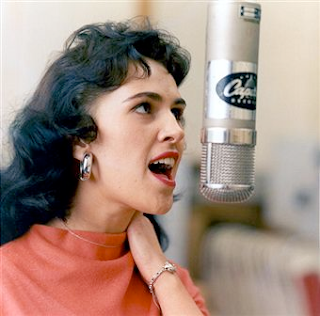Saturday, June 26, 2010
Song Of The Day: Dim Lights, Thick Smoke (And Loud, Loud Music)
Tuesday, June 22, 2010
Album Roots: The Byrds - Sweetheart of the Rodeo
Sunday, June 20, 2010
Happy Father's Day
 That Silver-Haired Daddy Of Mine
That Silver-Haired Daddy Of MineFriday, June 18, 2010
Classic Radio Broadcasts - On This Date (6/18)
Thursday, June 17, 2010
Classic Recording Sessions - On This Date (6/17)
Wednesday, June 16, 2010
Classic Recording Sessions - On This Date (6/16)

One hour dragged into two, and then three, and still nobody had spoken to the boys. Finally Oberstein brushed through the room and noticed Earl reading his newspaper. “What do you think this is, a reading room?” he snapped. “I don’t care what it is,” Earl snapped back. Oberstein then asked them what they thought they were doing there, and seemed surprised when they said their names were Bolick and they had been told to come and make records. “We understood that you had broken up,” he said. He had given their spot to somebody else. “You’re the boys who copy the Monroe Brothers, aren’t you?” he said. Again the brothers protested; they had replaced the Monroe Brothers on WGST, but they had never even heard them, let alone copied them. “Being that you’re here, I’ll give you an audition,” Oberstein finally said.
Oberstein went back into the little room that he had rigged up as a control room, and the brothers unpacked their guitar and mandolin. They checked their tuning, and then began singing into the big carbon microphone.
There’s a sunny side, where no ills betide,
On the road that we must go,
There are pleasant vales, verdant hills and dales,
Where flowers ever grow.
After a few more lines of “On The Sunny Side Of Life,” Obserstein was running out of his control room. “That’s enough,” he said. “That’s good. That’s nothing like the Monroes. It’s very different, and I think we’ll just go ahead and record you.” By now it was afternoon, and the boys began recording the material they had worked up for the session – all songs that were proven favorites with radio fans, and songs that, the boys felt, were new to records. In addition to “Sunny Side Of Life,” they did nine other pieces, ranging from old Victorian loves songs to prison songs like “I’m Just Here To Get My Baby Out Of Jail.” Of the ten songs preserved that afternoon, five were gospel tunes; the resulting Bluebird records were to write a new chapter in the history of country gospel music.
After the session, Eli Oberstein debated about what name to use for his new discovery. “At that time there were a lot of brothers recording,” recalls Bill. “So he suggested we use another name besides the Bolick Brothers. Eli and I sat down and kicked it around and came up with the name Blue Sky Boys, mainly because we were from the western part of the state, which was known as the Land of the Blue Sky.” Thus was born the name that for many came to stand for the very essence of old-time brother duet harmony singing – the Blue Sky Boys.
What a fabulous start to a recording career! I love these recordings, and I hope you enjoy them too...
Sunday, June 13, 2010
Classic Recording Sessions - On This Date (6/13)


Saturday, June 12, 2010
Classic Recording Sessions - On This Date (6/12)

Ernest Tubb - 61 years ago
Friday, June 11, 2010
Classic Recording Sessions - On This Date (6/11)

The three hits from this session, as well the rest of his United Artists singles are contained on Omnivore Recordings' recent release The Complete United Artists Solo Singles.
Thursday, June 10, 2010
Classic Recording Sessions - On This Date (6/10)

Tuesday, June 8, 2010
Classic Recording Sessions - On This Date (6/8)

Monday, June 7, 2010
Classic Recording Sessions - On This Date (6/7)

































.jpg)




